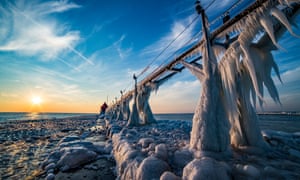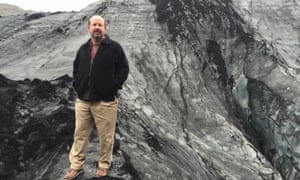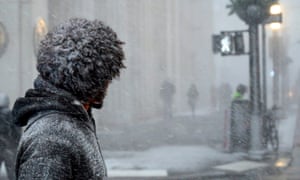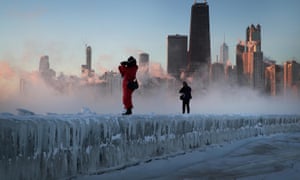The reaction to the polar vortex reminds us it is important to have a
citizenry who can distinguish between scientific fact and fiction
The winters of the early 1970s were very cold and snowy in the northeastern United States
where I grew up – as elsewhere around the US and Europe. I remember
snowfalls that came up to my chin (though, of course, I was only a few
feet tall back then). We now call those “old-fashioned winters”,
precisely because they have grown so rare as a consequence of – yes –
global warming.
If you’re younger than I am (I became a demi-centenarian three years ago), those winters are likely to be outside the range of your experience. And so it may seem plausible to you that cold snaps, that in reality simply reflect the sort of weather that was commonplace just decades ago, might constitute “record” or “unprecedented” cold.
Such a myopic view of weather extremes can be exploited by those who look to cast doubt on the overwhelming scientific consensus behind human-caused climate change. Very much in that vein, Donald Trump recently asserted in a tweet about the cold spell in the midwest that “windchill temperatures are reaching minus 60 degrees, the coldest ever recorded”. He added: “What the hell is going on with Global Waming [sic]? Please come back fast, we need you!”

If you’re younger than I am (I became a demi-centenarian three years ago), those winters are likely to be outside the range of your experience. And so it may seem plausible to you that cold snaps, that in reality simply reflect the sort of weather that was commonplace just decades ago, might constitute “record” or “unprecedented” cold.
Such a myopic view of weather extremes can be exploited by those who look to cast doubt on the overwhelming scientific consensus behind human-caused climate change. Very much in that vein, Donald Trump recently asserted in a tweet about the cold spell in the midwest that “windchill temperatures are reaching minus 60 degrees, the coldest ever recorded”. He added: “What the hell is going on with Global Waming [sic]? Please come back fast, we need you!”


In the absence of planetary warming, that ratio should be one to one. Maybe, you say, it’s a fluke. After all, it’s only one month of data. But the ratio of warm to cold records is roughly two to one for the past decade.
We can now go a step further, “attributing” record warm spells to global warming by employing climate models to quantify the incidence of extreme events, both with and without the effect of human-caused greenhouse warming. The extreme European heatwave last summer was, according to one such estimate, made twice as likely by human-caused climate change. (In reality, this is probably an underestimate because the models do not capture some of the effects of a slowing jet stream analysed in some of my own recent research). So we’re seeing a trend toward more record heat, not record cold. And, even if we were seeing an increase in cold winter outbreaks in certain parts of the US and Europe, it wouldn’t necessarily contradict the case for climate change – it might even be symptomatic of it, associated with the breakdown in the polar vortex.
Let us return to Trump’s tweet, for it does not stand in isolation. It is part of a several-years-old pattern of denying the basic scientific evidence for human-caused climate change. Trump is plainly not the “genius” he has claimed to be, but he knows that climate change is real. We know this because he cited it as a reason to be granted a special dispensation to build a wall – a wall to protect his golf course in Ireland from the damaging effects of a rise in sea level.

So, if it’s not due to ignorance, what is responsible for Trump’s continued climate-change denial? Could it be the same thing responsible for him outsourcing his energy and environmental policy to fossil fuel interests? Could it have something to do with Russian influence that some have suggested helped get him elected?
We may have some answers to these questions when special counsel Robert Mueller completes his investigation into Russian meddling in the 2016 US presidential election.
In any case, Trump’s repeated dismissive comments about human-caused climate change are an example of what I have referred to as “the weaponisation of ignorance”. The ignorance in this case isn’t Trump’s. He appears to know better. It’s the electorate’s.
Only with an ill-informed citizenry could you plausibly dismiss the consensus of the world’s scientists based upon a single cold spell. Trump and, more to the point, the fossil fuel interests whose bidding he is doing have weaponised the public’s poor understanding of science.
The great Carl Sagan presaged this very scenario in his classic work The Demon-Haunted World. Sagan feared a descent into ignorance and expressed his apprehension of a future in which “no one representing the public interest can even grasp the issues”.
He worried about the emergence of a citizenry that is unable to differentiate between “what feels good and what’s true” and is therefore vulnerable to pseudo science and anti-science.
With the election of Donald Trump, have we finally arrived in the future that Sagan so feared? And if so, is there any escape from it? That remains to be seen.
• Michael E Mann is distinguished professor of atmospheric science and director of the Earth System Science Center at Penn State University. He is the co-author of The Madhouse Effect

No comments:
Post a Comment